I’m Linke Fu, a third-year Ph.D. candidate under the supervision of Professor Bingjun Xu in the College of Chemistry and Molecular Engineering (CCME) at Peking University. Beyond academic pursuits, I serve as the captain of Peking University’s Team of Wushu Sanda, a modernized version of mixed martial art originated from Chinese kungfu, and I have won multiple first and second places in Beijing and national collegiate Wushu Sanda competitions. While scientific inquiry demands rigorous focus, martial arts training teaches me the wisdom of balancing tension and relaxation – two kinds of complementary qualities that find harmonious unity in my life. Beyond earning honors, I have established physical activity as a lifelong practice that will accompany me perpetually.
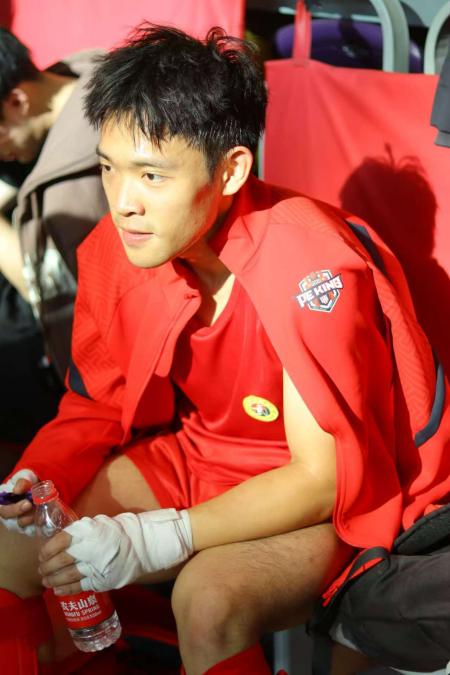
My encounter with Sanda began in 2019. As a freshman entering Peking University, my outstanding performance in a boxing elective class caught the instructor’s attention, leading to my recruitment into the Sanda team. This serendipitous opportunity unveiled an unexpected chapter of life. After the initial novelty faded came endless repetitions of drills and error corrections. Within the monotony of daily training, I was fortunate to encounter experienced coaches and supportive teammates. From a greenhorn motivated merely by physical fitness to my current role as team captain, it was their shared joy, healthy rivalry, and encouragement that sustained my perseverance.
Unlike most academic scenarios, confrontation lies at Sanda’s core. On the combat stage, we compete not merely in strength and speed, but more crucially in courage and intellect. When locking eyes with an opponent across the mat, salvation comes only from within. The courage to attack unknown adversaries, tactical adaptations to opponents’ characteristics, and resolute counterattacks after being struck or pinned - these constitute both the greatest challenges and the most compelling allure of combat sports.
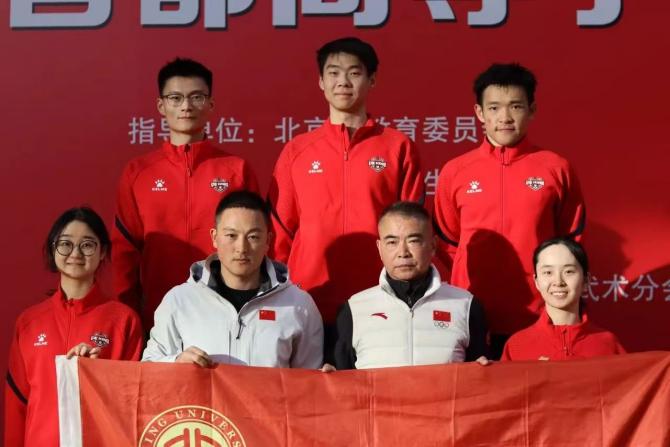
Part of the Sanda team of PKU
The cruelty of competitive athletics manifests in the direct proportionality between trophy weight and sweat expended. At my debut 2023 National Collegiate Wushu Sanda Championship, after overcoming numerous obstacles to reach the finals, I lost the gold medal due to flawed tactics and hesitant execution. In the subsequent year, I intensified Sanda training to over 10 hours a week while maintaining functional conditioning. Moreover, a true martial artist must temper not only muscle memory but also tactical cognition. During drills, I constantly visualized opponents and committed fully to each movement. This dedication bore fruit a year later when I successively claimed titles including Beijing Collegiate Champion and National Collegiate Champion.
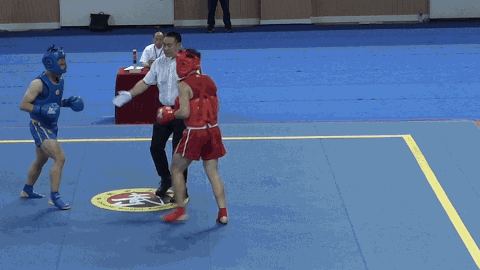
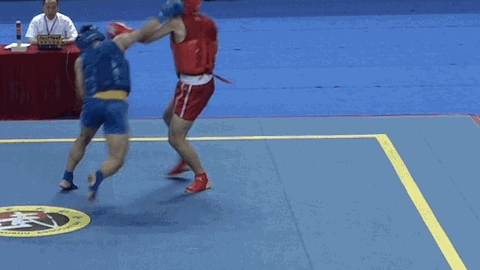
Moments during competitions (the blue one)
Sanda has long transcended physical conditioning to reshape my existential dimensions. The split-second transitions between offense and defense on the mat cultivate the decisive judgment critical for scientific breakthroughs. The daily process of pushing physical limits forges the mental resilience needed to handle complex experiments. More precious still, this seemingly solitary sport actually builds a powerful spiritual community - coaches devising personalized scientific regimens, teammates functioning as symbiotic sparring partners - teaching me profound truth: true strength requires both solitary combat readiness and symbiotic coexistence.
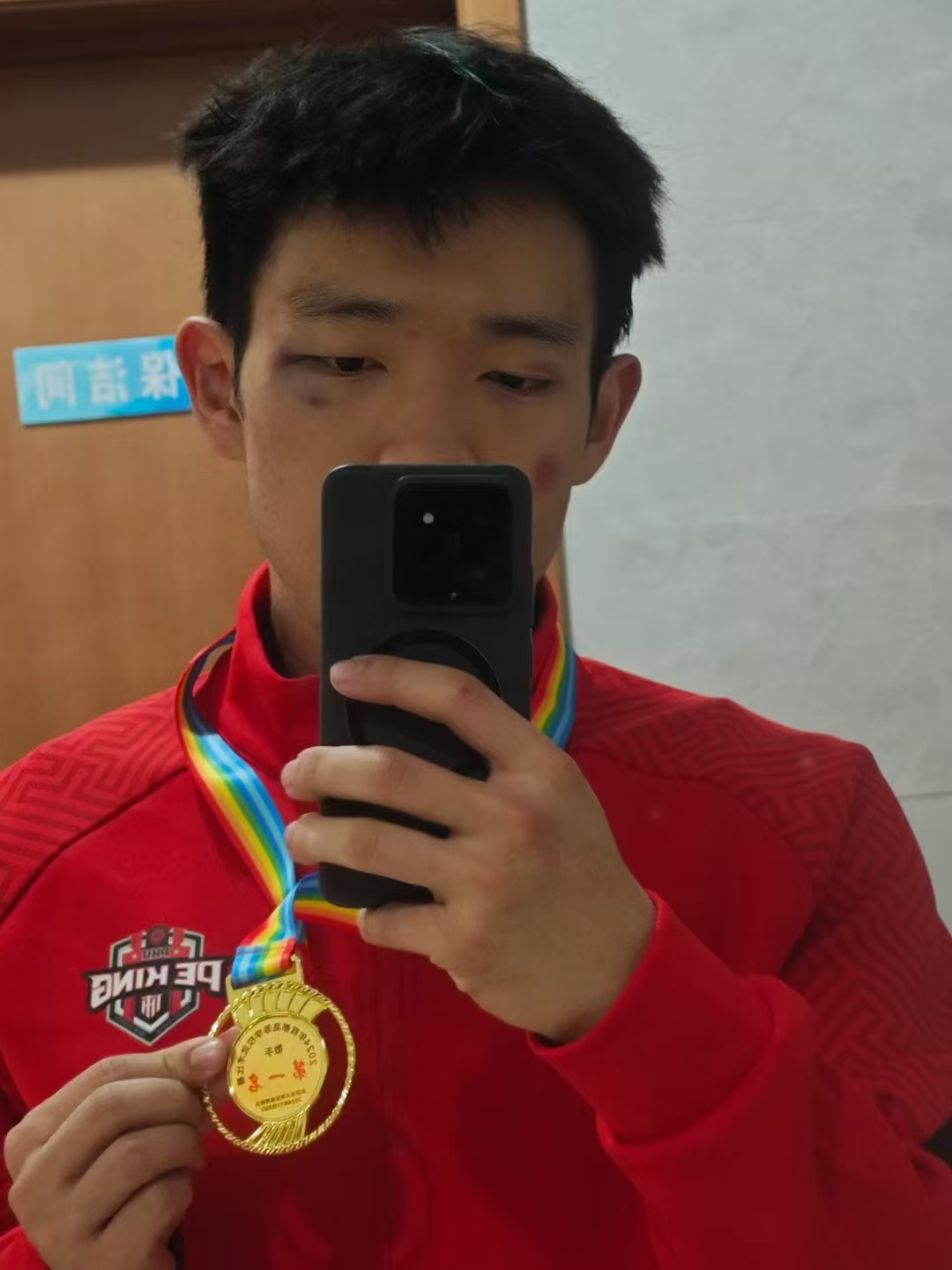
Maintaining seven years of systematic training, especially during graduate studies, owes profoundly to my advisor Professor Bingjun Xu’s enlightened mentorship. Our research group’s flexible yet efficient management model allows dynamic schedule adjustments according to competition cycles. This trust and support enable me to sustain required research productivity while achieving continuous athletic breakthroughs.
When asked about balancing both pursuits, I often recall the potential energy surface concept in chemistry - seemingly disparate academic and athletic endeavors fundamentally share the quest for optimal pathways. Laboratory-cultivated systematic thinking helps design more scientific training plans, while Sanda-honed stress resistance maintains clarity when confronting research bottlenecks. This bidirectional empowerment perhaps embodies the most precious growth gift Peking University bestows upon us.
Reflecting at my Ph.D. program’s third-year juncture, those days shuttling between laboratories and training halls have permanently engraved Peking University’s ethos of “Complete Personality, Primacy of Sports” into my life’s code. If chemical research reveals matter’s operational laws, Wushu Sanda teaches the balancing art of mind-body mastery. This capacity to shift seamlessly between microscopic worlds and combat arenas will ultimately cast unique illumination along my future scientific journey.





